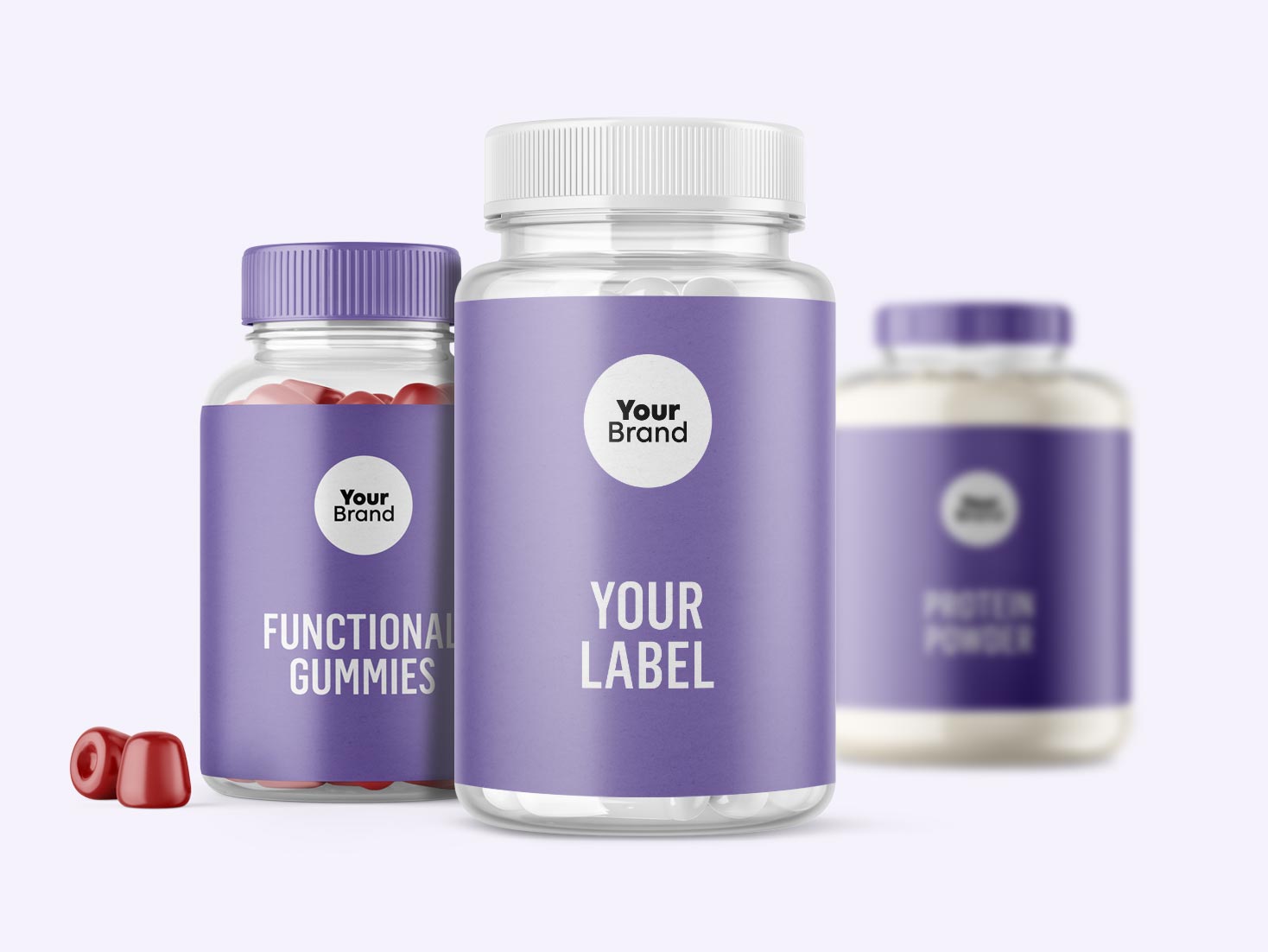Lohnherstellung bedeutet, dass ein Produzent in deinem Auftrag und nach deinen Spezifikationen ein Produkt herstellt und liefert.
Auf das Thema Lohnherstellung gehen wir in diesem Post detailliert ein. Lesenswert!
Dies kann eine großartige Lösung für kleine und mittlere Unternehmen sein, die Nahrungsergänzungsmittel produzieren möchten, aber nicht über die Ressourcen oder das Wissen verfügen, um die Produkte selbst herzustellen.
Es gibt jedoch einige Dinge, die du beachten solltest, wenn du dich für Lohnherstellung interessierst.
In diesem Artikel lernst du:
- Was ist Lohnherstellung?
- Vor- und Nachteile der Lohnherstellung
- Wie findest du die richtige Lohnhersteller für Nahrungsergänzungsmittel?
- Tipps und Tricks für die Zusammenarbeit mit einem Lohnhersteller
Was ist der Unterschied zwischen Private Label und Whitelabel Nahrungsergänzungsmitteln?
Wenn du dich für Lohnherstellung interessierst, hast du vielleicht auch die Begriffe "Private Label" und "Whitelabel" gehört. Aber was bedeuten diese Begriffe eigentlich?
Tatsächlich gibt es keine "offizielle" Definition oder Unterscheidung der beiden Begriffe. In der Regel werden diese aber wie folgt definiert:
Private Label Produkte sind Produkte, die von einem Hersteller für ein anderes Unternehmen hergestellt werden und das Unternehmen verwendet seine eigene Marke oder sein eigenes Label auf dem Produkt. Hier beginnt die Zusammenarbeit bereits bei der Rezepturentwicklung. Das bedeutet, dieses Produkt gibt es in dieser Form nur einmal und wird exklusiv für die Marke hergestellt.

Whitelabel Produkte sind bereits bestehende Lösungen, Formulierungen oder Rezepturen, die einfach mit einem anderen Etikett oder einer anderen Verpackung versehen werden. Den Inhalt des Produkts findest du so also unter Umständen auch bei anderen Brands.
Die verschiedenen Darreichungsformen von Nahrungsergänzungsmitteln:
Kapseln

Kapseln zählen zur beliebtesten Darreichungsform von Nahrungsergänzungsmitteln. Das hat mehrere Gründe. Zum einen, weil die Entwicklung wesentlich einfacher ist, denn hier muss man nicht darauf achten, dass das Produkt schmeckt.
Bedeutet, du kannst dich fast ausschließlich auf die Wirkstoffe konzentrieren. Nur Rieselhilfen sind oft noch notwendig, aber im Anteil verschwindend gering.
Ausserdem sind diese in Dosierung und Anwendung super einfach. Unterschieden wird hier zwischen harten und weichen Kapseln:
Hartkapseln
Hartkapseln bestehen in der Regel aus HPMS, einem veganen Cellulose-Stoff. Diese gibt es je nach Anforderung in verschiedenen Größen.
Weichkapseln
Weichkapseln eigenen sich für alle flüssigen Inhalte wie zum Beispiel Fischöl.
Tabletten
Tabletten sind in der Pharmazie der Klassiker, finden zwar bei Nahrungsergänzungsmitteln auch ihren Einsatz, sind aber nicht so beliebt. Vor allem des Geschmacks wegen.
Am beliebtesten sind Tabletten als Brausetabletten, also zum Auflösen in Wasser.
Pulver
Pulverprodukte sind am einfachsten in der Herstellung. Denn diese müssen nicht extra in Kapseln abgefüllt oder in Tablettenform gepresst werden.
Auch gibt es hier sehr viele Packagingoptionen wie Packer, Braungläser oder Doypacks.
Herausforderungen sind hier immer wieder Geschmack und Löslichkeit. Unser Tipp: Shakes. In Kombination mit Pflanzendrinks wie Sojadrinks oder Haferdrinks verbessert sich zum einen die Löslichkeit und zum anderen kann man den Geschmack besser kaschieren.
Flüssigprodukte
Ob in Ampullen oder als Fertigdrink (wie zum Beispiel yfood) - Flüssigprodukte zählen zur Königsdisziplin. Je nach Anwendung ist es immer wieder eine große Herausforderung Funktion und Geschmack sinnvoll zu kombinieren.
Functional Gummies oder Vitamin Gummibärchen

Nahrungsergänzungsmittel als Fruchtgummies sind noch recht neu, zählen aber jetzt schon zu den am schnellst wachsenden Kategorien im Bereich Nahrungsergänzungsmittel.
Auch hier liegt die Herausforderung in der Produktion. Noch gibt es nämlich nicht viele Hersteller, die in der Lage sind funktionale Zutaten in Gummibärchen zu verarbeiten.
Functional Gummies sind deshalb so beliebt, weil viele Menschen Probleme beim Schlucken von Kapseln oder Tabletten haben. Gummies sind die perfekte und vor allem leckere Alternative.
Unterschiede zwischen Lebensmittel und Nahrungsergänzungsmittel
Was sind die rechtlichen Unterschiede zwischen Lebensmitteln und Nahrungsergänzungsmitteln?
Der Unterschied liegt hauptsächlich in den Verordnungen. Wenn du ein Nahrungsergänzungsmittel auf den Markt bringen möchtest, unterliegt das Produkt der sogenannten Nahrungsergänzungsmittelverordnung.
Das bedeutet, es gibt strenge Richtlinien und Regularien, die du einhalten musst. Sowohl bei der Produktion als auch bei der Werbung für das Produkt.
Bei Lebensmitteln gelten andere Regelungen, hier ist die EU-Lebensmittelinformationsverordnung maßgeblich.
Produktentwicklung: Darauf solltest du achten
Hier aus unserer Erfahrung die wichtigsten Schritte bei einer Produktneuentwicklung:
Ideation und Research
Dieser Part wird gerne geskipped, macht aber hinten raus viel Arbeit. Gemeint sind hiermit Markt- und Wettbewerbsanalyse, sowie eine Zielgruppenanalyse. Mache dir also Gedanken wo und wie du dein Produkt platzieren möchtest und wer deine Kund:innen sein werden.
Concept & Prototyping
Entwerfe ein Konzept deines Produkts und versuche möglichst früh Feedback deiner Zielgruppe zu erhalten. Am besten hast du bereits einen ersten Prototypen wie zum Beispiel Muster oder eine Produktion in kleiner Stückzahl.
Production & Go To Market
Steht die finale Rezeptur, geht es in die Lohnherstellung deines Produkts. Wir achten dabei immer auf einen möglichst "leanen Approach", also darauf, die Ressourcen möglichst sinnvoll einzusetzen, um möglichst früh zum sogenannten "Product Market Fit" zu kommen:
Product Market Fit
Bedeutet: Dein Produkt passt zum Markt bzw. zu deiner Zielgruppe. Du löst die Probleme deiner Kund:innen, sammelst positive Produktbewertungen und dein Nahrungsergänzungsmittel wird nachbestellt.
Was ist der Unterschied zwischen Lohnherstellung und Lohnabfüllung?
Lohnherstellung ist der Oberbegriff, der sowohl die Produktion als auch die Abfüllung umfasst. In der Regel spricht man hier von einem Full Service Lohnhersteller.
Lohnabfüllung bedeutet, dass du dein Produkt bereits produziert hast und nur noch abgefüllt werden muss.
Was bedeutet Konfektionierung?
Konfektionierung umfasst alle Arbeitsschritte, die nötig sind, um ein Produkt fertig für den Versand an deine Kund:innen vorzubereiten.
Dazu gehören zum Beispiel das Verpacken, das Bedrucken oder das Beschriften der Produkte.



